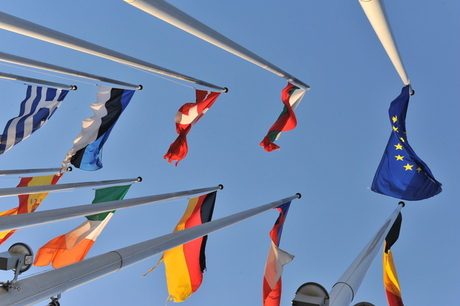EU Leaders to Pick New Faces for Top Jobs

European leaders were set to fill two of the top jobs in Brussels on Saturday, with Polish premier and Kremlin critic Donald Tusk favourite to become EU president amid deepening tensions with Russia.
Italy's Foreign Minister Federica Mogherini is meanwhile tipped to head up the 28-member bloc's diplomatic service as it faces a series of challenges on its borders.
"I think we will be able to take a decision," said German Chancellor Angela Merkel when asked about the two positions, as she arrived at an EU summit that would also discuss the situation in Ukraine.
Merkel, the EU's most influential leader, has been a strong backer of Tusk, a pro-European free marketeer with roots in Poland's Solidarity anti-Soviet trade union.
The Polish premier, who speaks neither English or French, seems to have overcome a personal clash with Britain's David Cameron over migration policy to be favourite for the job.
With leaders unnerved by Russia's latest actions in Ukraine, the nomination of Tusk to replace Belgium's Herman Van Rompuy as EU president would also send a firm message to Moscow.
Tusk said nothing as he arrived at the summit building, flashing only a smile and wagging a finger at the barrage or reporters.
Irish Prime Minister Enda Kenny cautioned, however, that Tusk's appointment was not a done deal. Surprises are quite common in often complicated EU negotiations.
A longer-shot to replace Van Rompuy is Denmark's prime minister, Helle Thorning-Schmidt, who is probably best known internationally for taking a selfie with U.S. President Barack Obama during the funeral of Nelson Mandela.
A moderate social-democrat -- and very well-liked by the British and the media -- she could bring some welcome positive media attention to the European institutions, often criticized for being dull and aloof.
Favorite to replace Catherine Ashton as head of the EU's foreign service is Mogherini, Italy's 41-year-old foreign minister, hailed by her supporters as a new, younger face for Europe.
"I don't usually bet, but I would put my money on those two," said Finnish Prime Minister Alexander Stubb as he arrived for the summit, referring also to Tusk.
"They're both very competent," he added.
Mogherini's candidacy initially faced fierce resistance, with Eastern European countries -- and reportedly British officials -- criticizing her as both inexperienced and too soft on Russia.
She was initially sidelined at a first summit in July. But six weeks later, and after Italy staunchly backed more sanctions against Russia, Mogherini seems well placed to take the role.
Hours before the summit, left-of-center EU leaders meeting in Paris formally backed her as the bloc's new foreign policy chief.
"I have high hopes that she will be chosen tonight," said French President Francois Hollande, eager to see a socialist and southern European in a top role.
The EU is effectively led by a trio and completing the group is the already named Jean-Claude Juncker, a European political veteran whose nomination to head the European Commission by EU leaders in June was met with fierce resistance from Cameron.
The former Luxembourg premier is in the process of filling posts for the next Commission with nominees provided by each member state.
Juncker's main problem is the lack of women on his team. Jose Manuel Barroso's outgoing Commission has nine women and so far governments have sent Juncker only four.
Lawmakers in the European Parliament, who must ratify his choices, have warned they would oppose a college of European commissioners with fewer women than today.



